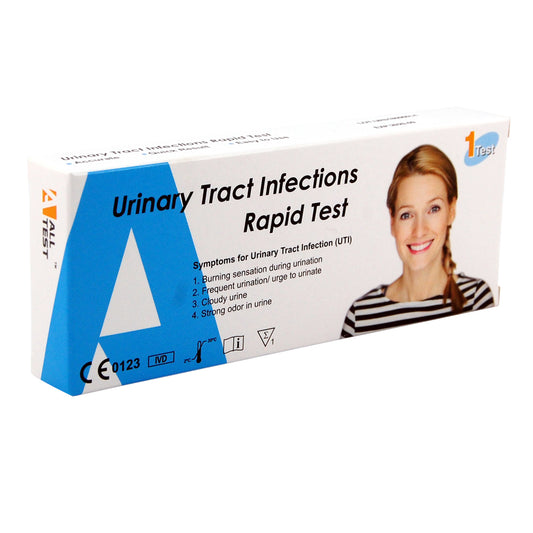Collection: Urinary Tract Infection Tests
-
ALLTEST 10 Parameter URS10 Urinalysis Urine Test Strips Pack of 100 test strips
14 reviewsRegular price From £6.75 GBPRegular priceUnit price / per -


VECHEK 11 Parameter Urine Test Strips For Vets And Pets URS Pot Of 25 Urine Strips Special Offer
2 reviewsRegular price £1.95 GBPRegular priceUnit price / per£5.95 GBPSale price £1.95 GBPSale -
ALLTEST Urine Infection Test Strip
No reviewsRegular price £3.25 GBPRegular priceUnit price / per£3.25 GBPSale price £3.25 GBP
Urine test strips to check for urine infection
Using a urine test strip to analyse a urine sample can be a quick and easy way to check for the presence of a urinary tract infection (UTI). These urine strips contain chemical reagents that react with certain substances in the urine, such as nitrites and leukocytes, which can indicate the presence of bacteria that cause a UTI.
To use the test strips, you typically dip the strip into a sample of your urine and wait for a few seconds for the reagents to react. The colours that appear on the strip can indicate whether or not a UTI is present.
It's important to note, however, that these strips are not always accurate and may give false positive or false negative results. Therefore, if you suspect you have a UTI, it's always best to consult with your doctor or another healthcare professional who can perform a more comprehensive evaluation, and provide appropriate treatment if necessary.
Frequently Asked Questions (FAQs) – Cystitis Tests
1. What is cystitis?
Cystitis is an inflammation of the bladder, usually caused by a bacterial infection. It can result in symptoms such as pain or a burning sensation when urinating, frequent urges to urinate, and cloudy or strong-smelling urine.
2. How do cystitis test strips work?
Cystitis test strips detect markers in urine, such as leukocytes (white blood cells) and nitrites, which can indicate a urinary tract infection (UTI). Some tests also check for protein and blood in the urine.
3. How accurate are these cystitis test kits?
Valuemed cystitis test strips are highly accurate when used correctly. They are similar to the tests used in GP surgeries and hospitals. However, a positive result should always be followed up with medical advice.
4. When should I use a cystitis test?
Use a test if you experience symptoms of cystitis, such as burning when urinating, frequent urination, or discomfort in the lower abdomen. Testing can help confirm if a urine infection is present.
5. How do I use a cystitis test strip?
- Collect a urine sample in a clean container.
- Dip the test strip into the urine for the time stated in the instructions.
- Remove and wait for the results to develop.
- Compare the colour changes on the strip to the reference chart provided.
6. What do the results mean?
- Negative: No signs of infection detected.
- Positive: One or more markers (such as leukocytes or nitrites) indicate a possible infection. You may need to consult a healthcare professional for treatment.
7. Can a cystitis test detect all urinary tract infections (UTIs)?
These tests can detect common UTIs, but they may not identify all infections, especially if the bacteria do not produce nitrites. If you have symptoms but a negative test, consult a doctor.
8. What should I do if my test is positive?
If your test is positive, drink plenty of water and seek medical advice, especially if symptoms persist or worsen. Your doctor may prescribe antibiotics if necessary.
9. Can men use cystitis tests?
Yes, men can use these tests, although UTIs are less common in men. If symptoms persist, seek medical advice as they may indicate other underlying conditions.
10. Can I use a cystitis test if I am pregnant?
Yes, but if you suspect a UTI during pregnancy, consult a doctor immediately, as untreated infections can lead to complications.
11. How should I store cystitis test strips?
Keep the urine test strips in their original container, tightly sealed, and store them in a cool, dry place away from direct sunlight. Do not use them after the expiry date.
12. Can I reuse a urine test strip?
No, test strips are single-use only. Each cystitis test should be used once and then discarded.
13. Do I need a prescription to buy these tests?
No, cystitis test kits are available to purchase online without a prescription.
14. Are there any lifestyle changes to help prevent cystitis?
Yes, drinking plenty of water, urinating after intercourse, avoiding perfumed soaps in the genital area, and wearing breathable cotton underwear can help reduce the risk of cystitis.
15. Do you offer discreet packaging for cystitis test orders?
Yes, all orders from Valuemed are shipped in plain, discreet packaging to protect your privacy.
15. Do any other infections cause similar symptoms to cystitis?
Yes, other conditions like STIs (chlamydia, gonorrhoea), vaginal infections (thrush, BV), interstitial cystitis, urethritis, kidney stones, prostatitis (in men), and diabetes can cause symptoms similar to cystitis, so it's best to seek medical advice if symptoms persist.
There are several tests that your doctor or other healthcare professionals can perform to diagnose a urinary tract infection (UTI):
- Urine analysis: This is a simple test that involves collecting a sample of urine and analysing it for the presence of white blood cells, red blood cells, and bacteria. The presence of bacteria and white blood cells in the urine can indicate a UTI.
- Urine culture: This test involves growing bacteria from a urine sample in a lab. This test can determine the specific type of bacteria causing the infection and help healthcare providers select the appropriate antibiotics for treatment.
It's important to note that your doctor or other healthcare professionals may use a combination of these tests to diagnose a UTI. If you suspect that you have a UTI, it's important to see a doctor or other healthcare provider for evaluation and treatment. UTIs can be easily treated with antibiotics, but if left untreated, they can lead to more serious complications.





